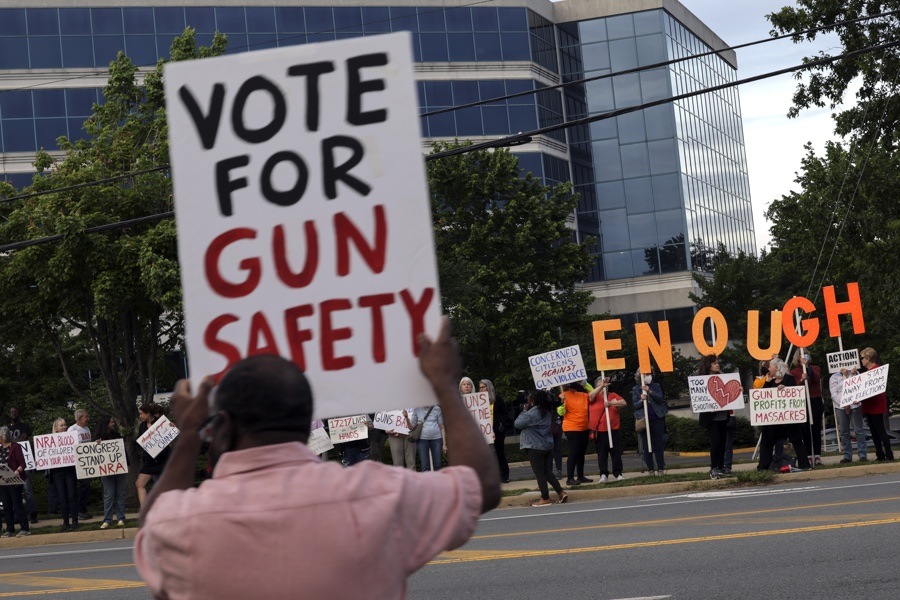What the Uvalde, Buffalo and Even Philly Shootings Have in Common
A recent pattern in these tragedies is that they involve marginalized people being killed in institutionally neglected spaces. We need to look hard at why that's so.

Gun-control advocates hold a vigil outside the National Rifle Association (NRA) headquarters on May 25, 2022, in Fairfax, Virginia, in the wake of the Uvalde shooting / Photograph by Kevin Dietsch/Getty Images
I’m not going to lie — it feels exhausting to have to write this.
Last week, 10 Black people were murdered by an armed gunman at a grocery store in Buffalo, New York.
Last weekend, six Black people were murdered in shootings across Philadelphia during the hottest weekend of the year thus far.
On Tuesday, 19 children and two adults who were mostly Latino were murdered by an armed gunman at a public elementary school in Uvalde, Texas.
There’s an undeniable pattern in this carnage that is regularly overlooked amid the “thoughts and prayers” and performative calls to action from politicians who will return to politics as usual once the news cycle concludes. So often, these tragedies are lumped in as part of a bigger issue that’s too unfathomable to tackle. The aftermath becomes a debate on comprehensive gun control (which is reasonable) or a conversation about mental health concerns and backdoor political lobbying. But these are surface-level arguments that don’t get at the real reasons such tragedies continue.
Translation: The perpetuation of mass shootings in America says a lot about white people’s comfort with inequity and the ongoing harm that inherent privilege inflicts.
That grocery store in Buffalo that was terrorized is in a former food desert, one that Black residents fought for years to fill.
The six Black people killed in Philly were largely in zip codes that are impacted by deep poverty.
That diverse public school in Uvalde, Texas, is a part of that state’s ongoing cycle of underfunded public education.
It should come as no surprise that the victims of such gun violence are often poor, working-class and/or marginalized Black and brown people living in neglected pockets of society. The only time the public at large seems to care about gun violence is when these incidents are mass shootings rather than more isolated acts. When affluent and predominately white areas such as Newtown, Columbine, Parkland and Squirrel Hill (Tree of Life Synagogue) were victimized, national conversations surrounding gun control have been pretty common. We’re paying a lot of attention to shootings again because they’re happening en masse — without really probing how society ignores less newsworthy incidents.
There’s a reason: Gun violence is truly a racial justice issue that disproportionately impacts and kills Black and brown people in ways that white people don’t concern themselves with until tragedy knocks on their door. Gun control is a conversation that Black and brown people talk about more often, because shootings are more frequent in our lives due to a broken system.
It should not be shocking that the decision-makers who hold the political and institutional power to tackle this issue are largely white and male. This is what maintaining white supremacy looks like — keeping a bureaucracy of power that benefits and protects well-off white people to the detriment of others. Nobody talks about gun control as Black lives continue to be disproportionately impacted by gun violence — but let a mass shooting happen that garners media attention, and the energy shifts. When it’s a school shooting, it’s inexplicable, and people get energized and angry, but when it’s a different kind of gun violence, it’s somehow explicable, and the outrage barely simmers.
No matter the identity of the shooter, gun violence in this country will never impact a country club, a private school, or a gated white community as frequently as it does an urban recreational center, an underrepresented place of worship, or a corner store. The moment I get an alert on my phone of a mass shooting, I’ve been conditioned to react with fear based on my identity and background while knowing that a subset of the population that disproportionately holds power can still sleep well. This isn’t a democracy, but an oligarchy — one that reinforces a tier of privilege and protection to some but not all.
For as long as I’ve been alive, this injustice has been socially acceptable. This city, this state and this country currently allow food deserts to exist, underfund public schools, and look on as impoverished neighborhoods perish. These kids stopped being “our kids” a long time ago. “Look out for your fellow neighbor” ideals died once gentrification knocked on the door. The constant pushback on diversity, equity and inclusion efforts in society shows us that citizens aren’t truly willing to walk the walk unless they’re forced. We live in a world where we’ve allowed there to be a hierarchy of concern around certain groups of people, and sadly, that hasn’t changed with who’s shot in America.
So why do white people continue to act stunned by all of these tragedies? I think because it’s easier to react than to wrestle with the role one plays with these issues.
It’s hard to reflect on these current tragedies and not mention that Wednesday marked the two-year anniversary of George Floyd’s murder. Immediately following his death, there were massive protests and calls for action. White people, at the time, made sweeping pledges to be better, made symbolic gestures, and gave money to things.
Today, as the paint fades from all those murals and streets memorializing Floyd’s death, so have those promises.
If there is any hope left in the fight for gun control, it’s up to white people to hold themselves accountable on getting it done.


